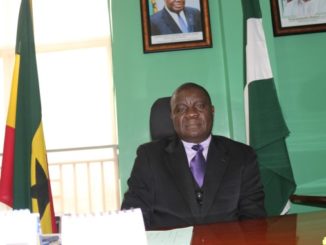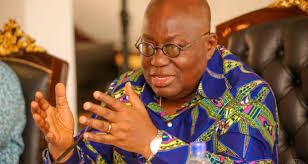
Reports that Ghana government as well as Ghanaian companies will not be able to transact business with European banks, has left Ken Ofori-Atta, Ghana’s Minister for Finance in tears, the heraldghana.com reports.
The Minister virtually cried before the EU ambassador to Ghana, Diana Acconcia, over the decision by the European Union to add Ghana to the “blacklisted countries for non-compliance with money laundering rules” saying the decision is like “a sledgehammer thrown at us”.
He made these remarks when he met the European Union Ambassador on Thursday, October 1, 2020 to Ghana to sign an agreement for some 87 million Euros budgetary support labelled as a “Coronavirus response”.
Ofori-Atta said: “As you know, the EU put us on the grey end of the blacklist because of our discussions with the Financial Action Task Force (FATF). That’s quite debilitating and so we are hopeful to be off the list in December and that the EU will also expeditiously take us out of that.”
He continued: “It sometimes looked quite incongruent. When we see issues such as HSBC Bank right at your door and then we feel like a sledgehammer is being thrown at us for an event that has not occurred but in preparedness, we are moving aggressively to get that and we’ll seek your support when we get off the FAFT list, that the EU reciprocates quickly.”
Ghana has been placed on a list of countries under the watch of the EU for certain money-laundering activities due to an observation by the FATF, the Inter-government organization recognized by the World Bank and IMF for instituting policies aimed at combating money-laundering and terrorism.
The EU on May 7, 2020, proposed to the European Parliament to include Ghana among 11 other countries on the money-laundering blacklisted countries, thus putting financial transactions under greater scrutiny.
The 12 countries which were subsequently banned effective this October are Ghana, Botswana, Mauritius, Zimbabwe, Bahamas, Barbados, Jamaica, Nicaragua, Panama, Cambodia, Mongolia and Myanmar.
But Ghana’s Ministry of Finance in a statement responded that the EU’s move does not reflect exactly the current status of Ghana’s Anti-Money Laundering and Countering the Financing of Terrorism (AML/CFT) (AML/CFT) regimes.
“This is unfortunate, and the Government of Ghana is always ready to engage with the EC [European Commission] about the true status of the country’s AML/CFT regime and efforts being made to strengthen same,” the statement read.
The financing agreement donates 87 million euro to budget support, to assist the country in its response to the COVID-19 crisis.
“This action shows the European Union’s continued commitment to our partnership with Ghana, especially during these challenging times”, said Diana Acconcia, EU Ambassador to Ghana, at the signing ceremony with the Minister for Finance, Ken Ofori-Atta and representatives of the EU Member States.
In May this year, Botswana, Ghana, Mauritius and Zimbabwe were part of 12 countries placed on the EU’s blacklist
The other countries blacklisted are Bahamas, Barbados, Jamaica, Nicaragua, Panama, Cambodia, Mongolia and Myanmar.
The European parliament was to approve the decision and it did this month; October.
Blacklisted countries were assessed based on systemic impact on the integrity of the EU financial system.
They were also assessed after going through a review by the International Monetary Fund as international offshore financial centers and economic relevance and strong economic ties with the EU.
These blacklisted countries would have to show more commitment towards tackling the problem to get off the list.
The EU said in a statement that “given the Coronavirus crisis, the date of application of today’s Regulation listing third countries – and therefore applying new protective measures – only applies as of 1 October 2020.
This is to ensure that all stakeholders have time to prepare appropriately. The delisting of countries, however, is not affected by this and will enter into force 20 days after publication in the Official Journal.”
In a statement the EU said “Bosnia-Herzegovina, Ethiopia, Guyana, Lao People’s Democratic Republic, Sri Lanka and Tunisia” have been taken off the blacklist after addressing the problem in their respective countries.
The EU commission’s executive vice-President Valdis Dombrovskis also said in a statement that “We need to put an end to dirty money infiltrating our financial system. Today we are further bolstering our defences to fight money laundering and terrorist financing, with a comprehensive and far-reaching Action Plan.”
Dombrovskis adds that “There should be no weak links in our rules and their implementation. We are committed to delivering on all these actions – swiftly and consistently – over the next 12 months. We are also strengthening the EU’s global role in terms of shaping international standards on fighting money laundering and terrorism financing.”
Last year the European Commission cited six African countries, namely Ghana, Botswana, Libya, Tunisia, Ethiopia and Libya for encouraging money laundering and terrorism financing.
The blacklisting according to the European Commission was to protect the EU financial system and prevent money laundering and terrorist financing risks.
But Ghana for example said in a statement last year that “the European Commission’s blacklist of Ghana does not reflect the current of Ghana’s anti-money laundering regime describing the move as unfortunate.”
Ghana maintained at the time that it was not given the opportunity to respond or implement corrective measures, which is the norm.
–
Ghanamatters.com/theheraldGhana



